Guide to Preventing Ear, Nose, and Throat Issues

Preventing ENT issues is not just about avoiding loud noises or cold weather; it’s about adopting a holistic approach to your overall health. Here’s widely recognized practices also with lesser-known tips, to help you safeguard your senses and enjoy a life of uninterrupted well-being.
Proven Strategies for ENT Health:
Hand Hygiene: Regular handwashing can prevent the spread of viruses and bacteria, reducing the risk of infections that can affect the ears, nose, and throat.
Avoid Smoking and Secondhand Smoke: Smoking damages the respiratory system and increases the risk of cancers in the throat and lungs. Avoiding tobacco smoke, including secondhand smoke, is vital for ENT health.
Protect Your Ears: Wear ear protection in loud environments, such as concerts and construction sites. Prolonged exposure to loud noises can damage hearing and lead to tinnitus (ringing in the ears).
Balanced Diet: A well-balanced diet rich in vitamins and minerals supports your immune system, helping your body fight off infections that can affect the ears, nose, and throat.
Stay Hydrated: Proper hydration keeps the mucous membranes in your throat and nose moist, reducing the risk of infections. Drink plenty of water throughout the day.
Manage Allergies: Allergies can lead to chronic nasal congestion and throat irritation. Identify and avoid allergens, and consult an allergist for appropriate management.
Practice Safe Swimming: Protect your ears from waterborne infections by wearing earplugs while swimming. Dry your ears thoroughly after swimming.
II. Lesser-Known Tips:
Nasal Irrigation: Using a saline solution to rinse your nasal passages can help clear mucus and irritants, reducing the risk of sinus infections and allergies.
Tongue Scraping: Gently scraping your tongue each morning can remove bacteria and toxins, promoting oral and throat health.
Essential Oils: Some essential oils, such as tea tree oil and eucalyptus oil, have antimicrobial properties. Diluted oils can be used for gargling or inhaled steam for respiratory health.
Chewing Gum: Chewing sugarless gum after meals stimulates saliva production, which washes away bacteria and neutralizes acids, protecting your teeth and throat.
Humidify Your Environment: Using a humidifier in dry indoor spaces helps maintain adequate moisture levels in the air, preventing dry throat and nasal passages.
Posture Correction: Maintaining good posture supports proper alignment of the throat and nasal passages, reducing the risk of snoring and breathing difficulties.
Mind-Body Practices: Stress and tension can manifest in throat problems. Practices such as yoga, meditation, and deep breathing can help manage stress and promote ENT health.
Prevention is the key to maintaining optimal ear, nose, and throat health. Your senses are invaluable; treat them with care and respect for a lifetime.


Responses